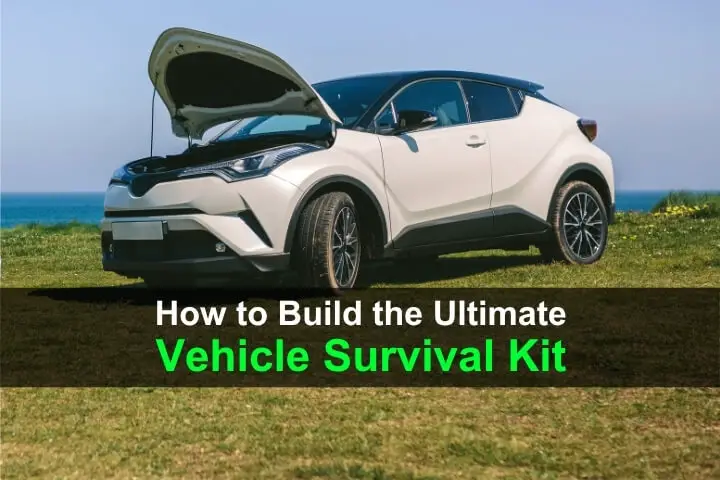Estimated reading time: 5 minutes

You never know where you’ll be when disaster strikes. You could be halfway home from work when a major power outage hits, or stuck in traffic as a wildfire jumps the highway. Maybe your car breaks down in the middle of nowhere and the nearest gas station is closed, the tow trucks are overbooked, and your phone signal’s gone.
Most people assume they’ll have access to their bug out bag or emergency supplies at home. But what if you’re not home? If not, your vehicle will be your lifeline. That’s why having a well-stocked survival kit in your car is essential.
This kit isn’t just for SHTF scenarios. It’s for flat tires on isolated roads, being snowed in during a winter commute, or evacuating in a hurry when you only have minutes to grab your keys and go. With the right gear, your vehicle can become shelter, a mobile pantry, and your best chance of making it through whatever comes next.
Want to save this post for later? Click Here to Pin It On Pinterest!
You don’t necessarily have to get everything on this list. Some of it depends on where you live and other circumstances. But if you do get all of this, you’ll be ready for just about anything. I broke the list up into the following categories:
Fire, Heat and Light
Shelter and Clothing
- Change of Clothes: Always include a dry set in case you get wet or muddy and need warmth.
- Coats: Use outerwear instead of your vehicle’s heater when waiting out delays to save fuel.
- Emergency Blankets: These trap body heat and work surprisingly well. They’re compact and efficient.
- Gloves: Protect your hands during repairs, cold weather, or while working on shelter.
- Ponchos: Keep yourself and your gear dry when it rains unexpectedly.
- Sleeping Bags: These provide warmth overnight if you can’t reach shelter before dark.
- Socks: Dry, warm socks are surprisingly morale‑boosting and critical in cold or wet conditions.
- Spare Shoes: Keep a dry, durable pair in case you need to walk long distances or walk across rough terrain.
- Umbrellas: A simple way to stay dry if you get stranded in rain without shelter.
Miscellaneous Essentials
- Batteries: Ensure you can keep flashlights, radios, or devices powered.
- Compass: A reliable lensatic marching compass helps you navigate when electronics fail.
- Emergency Food Bars: High‑protein bars supply quick calories during long delays.
- Emergency Whistle: A loud, multi-function signal device. Great for rescue or attention.
- First Aid Kit: Basic medical supplies are essential for treating injuries or illness.
- Folding Shovel: Handy for digging trenches, catholes, or clearing snow and debris.
- Food (long‑shelf life): Canned goods, MREs, or dehydrated meals. Don’t forget to rotate them regularly.
- LifeStraw: Crucial if you run out of water and need to purify whatever water you can find.
- Maps: Carry both a national atlas and local maps. These could be vital if GPS is offline.
- Metal Cup: A steel cup allows boiling water, melting snow, and cooking over flame.
- Mini Rescue Mirror: Compact signaling mirror can reflect light to attract attention.
- Multi-Tool: Versatile tools for cutting, grabbing, fixing and multifaceted emergencies.
- Paper Towels: For cleaning spills, hygiene, or tinder for fire.
- Toilet Paper: An essential hygiene item. I recommend these coin tissues as they take up less space.
- Water: Store at least one gallon per person per day for three days in case help is delayed.
- Pocket Chainsaw: Lightweight cutter for branches.
Vehicle Equipment and Maintenance
- Antifreeze/Coolant: Prevent overheating, engine damage, and frozen coolant in cold weather.
- Brake Fluid: Essential for maintaining brake system integrity if leaks occur.
- Extra Belts: Spare fan or serpentine belts can save you from getting stranded.
- Fix‑A‑Flat: Quick tire sealant solution when repair shops aren’t available.
- Flares: Highly visible hazard signaling to alert other vehicles to your presence.
- Fuses: Carry spares to replace blown electrical circuits on the go.
- Hoses: Temperature or pressure changes may cause hose failure. Spares can keep you moving.
- Ice Scraper: Essential for winter. Clear your windshield safely and quickly.
- Jack: Confirm it works and fits your vehicle. Critical for tire changes.
- Jump Starter: Most people have jumper cables, but that only works if there’s another vehicle. With this, you can jump start your vehicle any time. Just make sure to keep it charged.
- Lug Wrench: Basic tool necessary for swapping a spare tire.
- Magic Tank: A portable gas can to help when you’re running on fumes or limited stations.
- Oil: carry an extra quart of motor oil for topping off if levels are low.
- Ratchet Set: Basic sockets help with removing or tightening bolts, hoses or battery terminals.
- Replacement Bulbs: For headlights or brake lights that might blow during a trip.
- Screwdrivers: Phillips and flathead tools cover a wide range of minor repairs.
- Spare Tire: Make sure it’s full-sized or at least a high-quality donut spare.
- Transmission Fluid: An extra bottle aids you if you detect transmission slipping.
- Windshield Washer Fluid: Essential for visibility, especially in winter or dusty routes.
Like this post? Don’t Forget to Pin It On Pinterest!
You May Also Like:
Read the full article here






